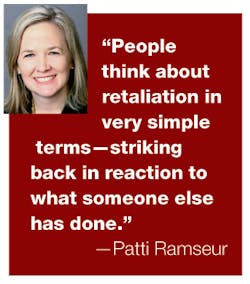Workforce: EEOC Retaliation Charges on the Rise
In April the U.S. Equal Employment Opportunity Commission sued Winfield Rubber Manufacturing Co. for alleged retaliation against one of its employees. The EEOC claims that the Winfield, Ala., manufacturer fired a manager because he had terminated an accused sexual harasser.
See Also: Manufacturing Workforce Management Best Practices
Penalizing a manager "for doing the right thing, stopping sexual misconduct and ensuring that victims know their rights" is unjustified, said Delner Franklin-Thomas, an EEOC district director.
Moreover, it violates Title VII of the Civil Rights Act of 1964.
Also in April, a Utah construction firm paid $230,000 to settle a racial harassment and retaliation suit, and earlier in 2013, BASF paid $500,000 to settle a retaliation lawsuit brought against Cognis Corp., which BASF acquired in 2010. In that case, an employee was fired after refusing to sign a "last chance" agreement, according to the EEOC. The agreement, which was a condition for continued employment, prohibited the employee from filing discrimination charges, even for events that had yet to occur.
Several factors explain the frequency of retaliation charges, not least of which is that anti-retaliation protection is a provision in every law enforced by the EEOC. As a result, a retaliation claim may be added to a sexual harassment or race discrimination charge, for example. Even more, because it is a separate charge, an employer cleared of a discrimination charge can still face a retaliation charge.
Another factor is the changing judicial landscape. Morey Raiskin, a labor and employment attorney at law firm Burr & Forman, cites a 2006 U.S. Supreme Court case, Burlington Northern & Sante Fe Railway Co. v. White, as a seminal case with respect to retaliation. It "expanded the protection employees receive after making a workplace complaint allegedly protected under Title VII," he says.
Employee-side employment lawyer Donna Ballman says the root cause of so many retaliation charges is more straightforward: "Retaliation is common in the workplace."
To combat such charges, "HR should scrutinize any write-ups and disciplines of complaining employees. If they don't make sense given the employee's history, then don't allow the supervisor to discipline the employee. Require proof other than the supervisor's word and the word of the employees closest to the supervisor," advises Ballman, author of "Stand Up For Yourself Without Getting Fired." She adds, "I can make my advice even more simple: Stop retaliating."
Nuances Introduce Complexity to Retaliation
That said, what constitutes "retaliation" has more nuances than the term may suggest. According to the EEOC, "An employer may not fire, demote, harass or otherwise 'retaliate' against an individual for filing a charge of discrimination, participating in a discrimination proceeding, or otherwise opposing discrimination."
"People think about retaliation in very simple terms -- striking back in reaction to what someone else has done," says Patti Ramseur, a partner at law firm Smith Moore Leatherwood and leader of the firm's labor and employment practice. "It is not plain and simple."
Not only is the language of the statute important, but so, too, is how courts interpret that language. In addition, "the facts of any individual case become very important," Ramseur says.
What can employers do to protect themselves against retaliation charges? Ramseur advises the following:
- Adopt clearly defined policies that prohibit any type of discrimination or harassment.
- Within the policies, prohibit any type of retaliation and define the procedure for reporting retaliation claims, including alternative claim procedures for employees who may be making the claim against an immediate supervisor.
- Document the policies in writing and have employees acknowledge in writing that they understand the policies, as well as the procedures for reporting claims.
- Assure that the policies are more than simply words on paper. In other words, train -- and retrain -- frontline supervisors, managers and anyone in a position to retaliate. The training is important, as well, if a retaliation charge gets as far as court. "It shows you take retaliation seriously," Ramseur says.
- Make sure procedures are in place to respond appropriately in the event a retaliation claim is brought forward: Immediately investigate, maintain confidentiality to a practicable degree, determine what actions are required, engage the complainant and follow up.
Adds Thomas Simeone, a partner in the law firm Simeone & Miller: "The best way for a manufacturer -- or any other employer -- to avoid a retaliation claim is to consistently enforce their rules -- in writing as much as possible -- on a daily basis long before any claim of discrimination is made. That way, they will be able to prove that disciplining of a claimant is not retaliation but their standard practice."
About the Author
Jill Jusko
Bio: Jill Jusko is executive editor for IndustryWeek. She has been writing about manufacturing operations leadership for more than 20 years. Her coverage spotlights companies that are in pursuit of world-class results in quality, productivity, cost and other benchmarks by implementing the latest continuous improvement and lean/Six-Sigma strategies. Jill also coordinates IndustryWeek’s Best Plants Awards Program, which annually salutes the leading manufacturing facilities in North America.
Have a story idea? Send it to [email protected].


